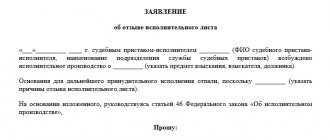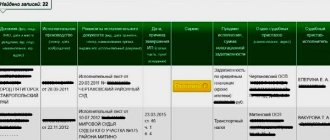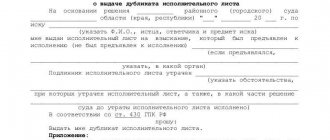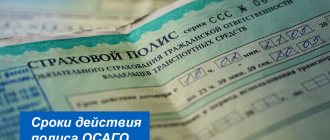Who can suspend IP
When a court decision to repay a debt comes into force, enforcement proceedings are initiated against the defendant. In the future, the actions of the bailiffs are based on the provisions of the documents received from the claimant or the court. In this case, the debtor is given 5 days to voluntarily repay the obligations. Otherwise, his assets (including bank accounts) may be seized until the debt is fully repaid. In addition, there is an obligation to pay an enforcement fee.
If new circumstances are identified that can influence the court decision, it becomes possible to suspend the individual entrepreneur for a certain period. The initiators are all interested parties, including plaintiffs, bailiffs, judges and the defendants themselves.
How does the review and suspension procedure work?
Before figuring out how to suspend enforcement proceedings, you need to find out how this issue will be considered and what the suspension procedure will be. The application is considered in accordance with the provisions of Article 324 of the Arbitration Procedure Code.
The procedure will take ten days. All participants and persons who may be affected by the case are notified of the start of the consideration of the case. In particular:
- debtor;
- claimant;
- bailiff.
If one of the parties does not appear at the hearing on this matter, this will not be a reason to postpone the hearing.
When the court considers the application and clarifies the nuances, a ruling is made. It will be passed on to all participants in the process. The decision may be satisfactory, but the suspension may be refused.
Grounds for suspension
Depending on the grounds, enforcement proceedings are temporarily terminated by a bailiff or directly by the court. The lists of grounds are listed in Art. 39 and 40 Federal Law “On Enforcement Proceedings”. The list is closed and does not allow controversial interpretations.
Provision is made for an appeal against the decision by a bailiff. To do this, you must contact higher bailiffs no later than 10 days after receiving the decision. If the decision is unsatisfactory for the applicant, he should apply to the judicial authorities with a request for a postponement. Payment of state duty in these cases is not provided.
Hotline for citizen consultations: 8-804-333-70-30
By decision of law
Current enforcement proceedings are authorized to suspend the bailiff in the event of such situations as:
- upon the death of the debtor or recognition of him as missing;
- the debtor has lost legal capacity;
- the defendant is a participant in combat operations as part of the Russian Armed Forces or other troops;
- bankruptcy proceedings are applied to the debtor;
- a petition was received to revise the timing and volume of performance fees;
- a moratorium on bankruptcy has been applied to the debtor;
- The defendant is undergoing treatment at a medical facility. organizations;
- searching for the defaulter, discovering his assets, establishing the whereabouts of the child;
- the defendant’s request for a deferment if he is serving in the ranks of the Armed Forces of the Russian Federation.
A superior bailiff is authorized to suspend the individual entrepreneur procedure if complaints have arisen against the actions of persons subordinate to him.
Positive aspects of the suspension of production?
Within the limits of suspended proceedings, the bailiff is not able to take any enforcement measures, for example: confiscate property from the debtor and other measures.
It would not be worth forgetting that the bailiff is not deprived of the opportunity to carry out actions specified by law related to the commission of enforcement actions that create the conditions under which the bailiff applies enforcement measures, for example: checking the accrual and deduction of relevant interest from the debtor’s salary, visiting and conduct a tour of the places of residence (location) of debtors, send requests to the relevant authorities to obtain the necessary information.
Delaying enforcement proceedings
It is possible to delay the IP on the initiative of interested parties. The courts consider the new circumstances identified and assess the degree of their significance. So, in order to pause or delay the IP, you can do the following:
- File a claim to challenge the bailiff's order to collect the enforcement fee.
- Claim for exemption from collection of enforcement fees.
- If it doesn’t work, then file a claim to reduce the amount of the enforcement fee.
- Application for deferment of payment of the enforcement fee.
- Application for installment payment of the enforcement fee (not to be confused with deferment).
- A claim for the release of property from seizure.
- Claim to challenge the assessment results.
Each claim in court can be considered from 6 months to 1.5 years. During the trial, enforcement proceedings are suspended and thus you can gain time before your property is taken away from you.
Duration of suspension
Documents must be reviewed within 10 working days. The law does not specify the time limits for suspending enforcement proceedings. It is valid until the reasons for the suspension are eliminated. It can be renewed by the court and the bailiff.
A judicial act to suspend enforcement proceedings is executed immediately.
State duty
An application to the court to suspend enforcement proceedings is not subject to state duty. This is explained by the fact that the requirements are put forward within the framework of an existing case.
Procedure for suspending enforcement proceedings
To suspend an individual entrepreneur, a corresponding petition is sent to the FSSP service or to the judicial authorities. The application is considered, and all interested parties are notified of the results, including the defendant, the creditor and the bailiff.
FAQ
I received a letter from the bailiffs that the court foreclosure on the loan was cancelled, can the bailiff subsequently resume proceedings again?
Check on the FSSP website for what reason the enforcement proceedings were completed or terminated. If you have not repaid this debt, then most likely it will be under Art. 46 part 1 clause 3. - return of the writ of execution to the claimant. If the claimant returns the sheet back to the bailiff, the proceedings will be restored.
Can the bank itself present a writ of execution to the accounting department of the organization where I work?
The claimant has the right to present a writ of execution to the bailiff, to the bank where the debtor's accounts are opened, or to the employer's accounting department if the debtor is an individual.
According to the writ of execution, 50% of the salary was withheld, but I did not know that the bank had filed a lawsuit. What can be done in such a situation?
If the amount of debt does not exceed 500 thousand rubles, then most likely the court issued a court order. It is necessary to go to court to cancel the court order and obtain an appropriate determination, which will be the basis for terminating the individual entrepreneur. But after the court order is canceled, the bank has the right to go to court to collect the debt. Your right to be present at this process and request a reduction in the penalty.
Application to court
When drawing up a petition, you need to describe in detail the reason for the suspension, indicate the problems that the defendant has encountered in connection with the discovery of new circumstances. When submitting an application, you should attach copies of documents, the consideration of which will help to suspend the individual entrepreneur procedure.
The application must be prepared indicating the following details:
- Name of the judicial authority.
- Applicant details (full name, address, contact details).
- Details of the writ of execution (grounds for the decision, number, date).
- Participants in the dispute (indicate the claimant and the debtor).
- Grounds for suspension.
Court decisions, summonses, sick leave certificates and other documents, depending on the circumstances, are attached as supporting documents that allow the applicant to apply for the suspension of enforcement proceedings.
The judicial authorities assess the degree of materiality of the arguments received. Based on the results of consideration of the enforcement proceedings, an act of suspension or refusal may be issued.
Articles:
Basic information about the re-initiation of enforcement proceedings
Refusal to initiate enforcement proceedings - what to do?
Application to bailiffs
As a rule, chief bailiffs slow down the progress of enforcement proceedings if there are factors of unsatisfactory work of their subordinates.
List of attached documents
- A copy of the writ of execution.
- A copy of the resolution to initiate enforcement proceedings.
- Documents confirming the existence of grounds for suspending enforcement proceedings.
- A copy of the application.
Registration of an appeal
The debtor submits an application to the bailiff in any form on purpose, by mail, in his personal account on the official FSSP portal or through State Services. We list the basic details that are recommended to be included in the application form:
- Name of the addressee, name of the performer.
- Contact information about the applicant (full name, registration address, information about the identity document, etc.).
- Document's name.
- Number, date of enforcement proceedings.
- Information about the judicial act, the claimant.
- Reasons for requesting suspension of enforcement.
- Expected duration of production interruption.
- Link to regulations.
- List of applications.
- Date, signature of the applicant.
The form is accompanied by a copy of the FSSP resolution, the applicant’s identity card, certificates, extracts, and other information that allows one to identify and evaluate the reason for the application.
Despite the free form of the application, it is necessary to indicate some basic information
The document can be presented to the bailiff directly by the debtor or his authorized representative on the basis of a notarized power of attorney. If the application is submitted to the FSSP department, we recommend making a copy of it to mark the acceptance of the document. This is one of the most reliable ways to submit a form.
When the debtor is temporarily unable to visit the territorial department of the service, you can send the form by registered mail with a list of attachments by mail or use remote resources. In any of the cases, the proceedings will be suspended only on the basis of the decision of the executor sent to the parties to the dispute.
When production resumes
If enforcement proceedings were suspended for an indefinite period by a decision of the court or bailiff, its resumption occurs after all the circumstances due to which the procedure was postponed have been eliminated. To renew the individual entrepreneur, a corresponding petition from the claimant or bailiff will be required, along with the elimination of the reasons for the suspension.
The judicial authorities resume a previously suspended decision in the following cases:
- a refusal to release the seized property was issued;
- completion of the procedure for challenging the lawsuit;
- the conflict was resolved based on the results of the assessment of the seized property;
- the defendant's return from a long business trip.
As a rule, the decision to resume enforcement proceedings is made by the arbitration court, which previously suspended the individual entrepreneur. In the presence of a number of circumstances, the period of suspension of the individual entrepreneur may be reduced.
Bailiffs also have the right to resume enforcement proceedings. To do this, you need a corresponding application from the claimant and evidence that the reasons that influenced the suspension have been eliminated. The grounds for renewal of individual entrepreneurs by bailiffs include:
- discharge of the defendant from medical institutions;
- the previously wanted debtor has been found;
- restoration of the debtor's solvency;
- withdrawal of the defendant from bankruptcy proceedings;
- completion of service by the debtor in the ranks of the Armed Forces of the Russian Federation;
- completion of the deferment period established by court decision.
The suspension of enforcement proceedings is not final. The decision made is subject to appeal. The IP comes into force again after the positive results of challenging or eliminating the reasons.
Definition
When one of the parties to a contractual relationship does not fulfill the terms of the agreement, the creditor is authorized to file an appeal to the court to protect its legitimate interests. The final stage of the trial is the issuance of a ruling, the issuance of a writ of execution and delivery into the hands of the plaintiff or his authorized representative. The debtor receives a copy of the form certified by an official vested with this authority.
Enforcement proceedings are regulations that combine a set of operations and measures used to fully satisfy the requirements of a judicial act.
This responsibility is assigned to a specialized civil service - the FSSP. The event is launched upon a written request from the claimant or a court decision. Suspension of proceedings is a temporary cessation of the implementation of forced collection measures. According to legal aspects, the procedure involves a break for an indefinite period of time, directly dependent on existing conditions.
A moratorium on the enforcement regime is imposed by a court decision or a bailiff’s resolution. The underlying reasons for suspending the procedure are approved by Art. 39-40 Federal Law No. 229 dated October 2, 2007. The list of motives is closed and is not subject to other interpretation.
Fully or partially?
The Law on Enforcement Proceedings provides that they may be suspended either in full or in part. In the latter case, the suspension concerns only individual executive actions.
The question of whether enforcement proceedings should be suspended in whole or in part is decided depending on the circumstances of the case (i.e. the reasons for its suspension). If it concerns only some enforcement actions, a partial suspension is allowed. In other cases, the court or bailiff issues a full suspension order.
Expert opinion
Lawyer Alexander Vasiliev comments
For example, if the basis for suspending enforcement proceedings is the challenge of the enforcement fee by the applicant, then it is suspended only partially - in terms of collection of the enforcement fee.
In most cases, a partial suspension occurs when the reason for the suspension is not absolute and the resolution of the issue depends on the discretion of the government body receiving it - the court or bailiff.









